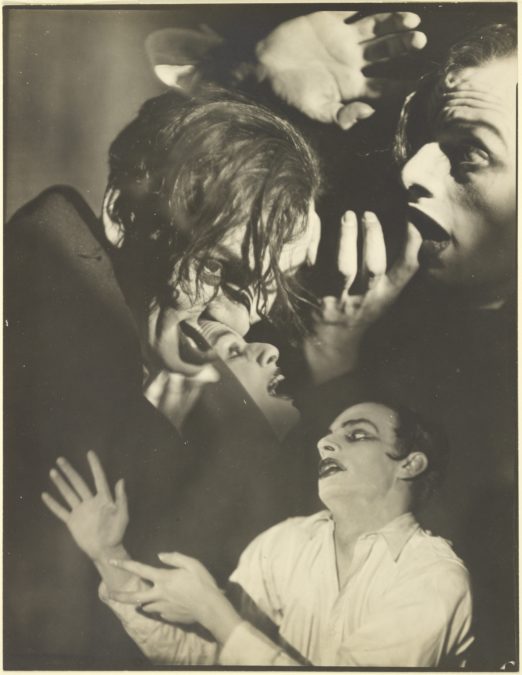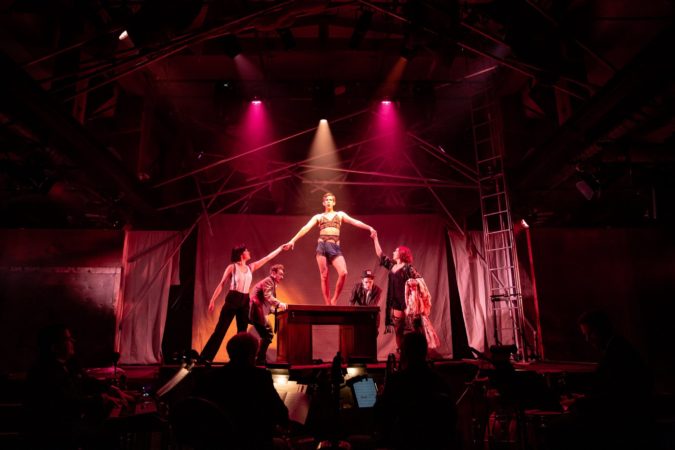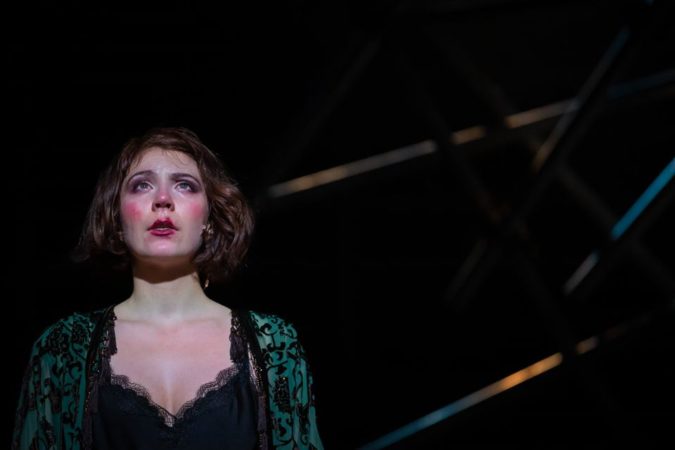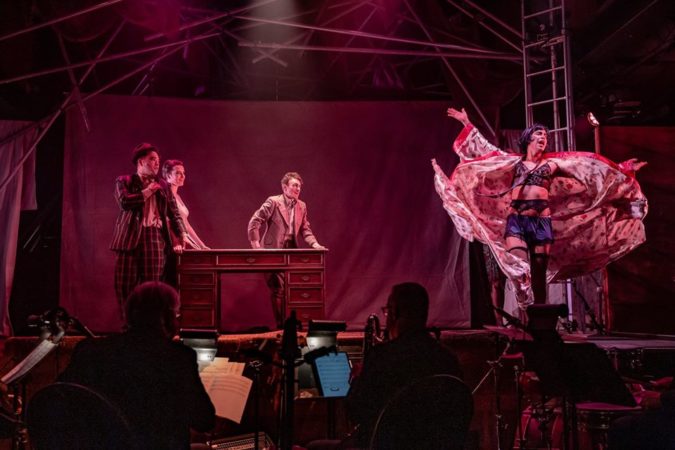PuShy Questions with Charles Barber from Berlin: The Last Cabaret
January 23, 2020
Charles Barber is the music director of Berlin: The Last Cabaret, showing at Performance Works from January 23-26. Click here for tickets and more show information.

1) What motivates your work as an artist?
I believe in music. I believe in the power of story-telling through music. I recognize the unique beauty and capacity of Opera, in particular, to tell great stories through music.
At City Opera we specialize in small forms: the up close, and the intimate discourse. In my own career as a conductor I have worked in many traditional houses including San Francisco Opera, and The Met (New York) as assistant to Sir Charles Mackerras. I learned a great deal in those capacities and I honour them all. For now, my interests have turned to the small forms. At City Opera, and in our latest project Berlin: The Last Cabaret, we have a venue and we have a vision. The venue and the vision correspond in this: they tell a story set in 1934 about the manufacture of chaos and the manufacture of lies. If that sounds contemporary, it is.
2) What does being part of PuSh 2020 represent for you?
City Opera has always sought to widen the definition of opera. We have told stories about Pauline Johnson, an extraordinary performance artist in the 19th century. We have told stories about missing and murdered aboriginal women, about PTSD in the battle of Fallujah, about the rediscovery and recreation of three lost operas that Mozart began but never finished. We have told stories that were written in a Nazi camp in 1943. We are, in 2021, telling a new story about an old and very great neighbourhood – Chinatown.
Through PuSh we now have an opportunity to widen the audience: to make people welcome who might not otherwise feel welcome at opera, to invite them – through our partnership with PuSh – to give it a chance, and to give themselves a chance to discover a form, a story, and an experience that, otherwise, they might never consider. The great power of PuSh in this enterprise is the imprimatur of daring and boldness that PuSh connotes to anyone who goes to any PuSh show. I myself have been doing so for years, and I feel quite familiar with the audience, and quite familiar with the expectations of the audience.
The partnership with PuSh allows us very directly, and very immediately, to say to folks who might not otherwise think that opera is for them, to come and see what’s in it for them. This show, particularly, is cabaret. It is a form of musical theatre, which as cabaret, is also new for us. It is thus reciprocal – a new audience, a new definition, and a new form. Where better than PuSh to try these wonderful things?

3) Is there anything you want audiences to keep in mind while experiencing your show?
It is not a National Geographic Special. It is a work of art. It is founded in the real history of the Weimar Republic, the real stories told in Berlin cabaret of the time, and it is told through five fictitious characters, all of whom speak to the reality of human beings, attempting to resist the powers and fears of nazism.
Our story is set in July of 1934. Hitler has been in power for 18 months. He is extending his powers every day, as rapidly as he can get away with it. Two weeks before our story is set, Hitler unleashes what has come to be known as The Night of the Long Knives. In this historical event Hitler turned on his own SA, a kind of semi-military organization, helmed by Ernst Röhm, that was becoming, in Hitler’s view, a rival to his authority. In one night, The Night of the Long Knives, Hitler attacked. He killed Röhm, all of his lieutenants, and many of his subalterns. He killed them, all. And he went on the radio, and he announced that he had done so, and declared why. In our story, set two weeks after this event, our five characters read about it in the paper, and thus our story is ignited.
Again, it is not a National Geographic Special – it is a work of art, but it is founded in history and reality. Also to repeat what I said earlier, it is desperately and dangerously similar to what many people are contesting today.
4) How might we see PuSh 2020 themes of subversion or vulnerability reflected in the work?
They are entirely and boldly reflected in Berlin: The Last Cabaret. Subversion is going to be, to every audience, self-evident. There are five cabaret singers who gather in an abandoned factory in Berlin in July of 1934 to give one last show for their friends, some of whom have already gone missing. These entertainers have, for years, been subverting, questioning, disturbing, and, in some ways, defining the culture and the forays of their period. They are trying one last time to do so in a kind of farewell. That, I think, parallels entirely the ambit of PuSh for this particular festival.
The vulnerability of these five entertainers lies in the fact that the audience already knows how our story turns out. And that emotional vulnerability will, I think, have huge emotional consequence for every audience. I happen to know how the show ends. Take it from me: it is not a comedy. People will be most moved by the finale and the finality of our story, and vulnerability is writ everywhere in the faces of our people.

5) What other PuSh show would you most like to see?
I can’t play favourites. We are pleased to recommend all PuSh shows.
6) What qualities do you most admire in other artists?
The genius of improvisation, truth telling, originality, and a unique voice.
My final conducting teacher was a fellow named Carlos Kleiber (who’s now gone and who’s father fled Nazi Germany). If you ever see his work, you will see a conductor of such staggering technical imagination, and such unique musical voice. At the same time you will bear witness to a man who understood, profoundly, the tradition of which he was such a great part.
I admire those three elements: endless technical capacity, extraordinary originality and imagination and speech, and a command of the tradition in which all of us stand today. Great artists constantly reinvent the contours of our traditions. That’s to me what great artists and companies do. And it’s what people who care about truth telling to a general public are obligated to do.
Berlin: The Last Cabaret is a form of truth telling that will be difficult to hear.
7) Any advice for emerging artists?
Be unafraid. Go to great mentors. Listen to what they tell you. Remain unafraid.
8) What do you do when you’re not working or making art?
It’s all I do.

9) What about Vancouver most entices you?
I have the advantage of being born in British Columbia, but I lived in California for 20 years. Much as I admire the spirit and enterprise of California, I find in Metro Vancouver in particular, a generosity and a sweetness that I admire very much. In Vancouver, even our buses say “Sorry”. I love that about our people.
Vancouver is not merely, almost the westernmost Canadian city, but is also on a north-south axis. As I have come to learn in my own life, there is a conduit of idea and art making that stretches from San Diego to Seattle to Vancouver. It’s for real. Part of it has to do with the time zone. Part of it has to do with the fact that here in California North we share a lot of values. We share a lot of history, we share a point of view, and we are very much more Pacific-oriented than our friends in Toronto and other eastern cities. Canada is the second largest nation on the planet and the vastness of distance in our nation defines, in some way, a kind of emotional asperity. But when you look at the west coast, north to south, you take a very different view of the creation of art.
Canada also has a great deal to offer north-to-south. This country has gun control and universal healthcare, thanks to Tommy Douglas. It’s appalling that America still doesn’t have it even though Obama tried. So we have much to offer the States. The north and south thing goes both ways. As someone who appreciates the fact that even our buses say “sorry”, I also recognize how much Canada serves as a model of tolerance and mutual respect, and mutual aid.
10) What is your biggest art-making wish or fantasy (if money were no object)?
The recreation of the Pantages Theatre: a 650 seat jewel box that we tried for four years to save. It had a glorious acoustic. It had perfect sight lines. It had an extraordinary history as the oldest proscenium theatre in Western Canada, and its loss was a terrible set back to the performing arts in Vancouver. If I won the lottery tomorrow, I would use all $100,000,000 to create a theatre of that sort and that capacity. In Vancouver we have lots of black boxes and lots of little theatres, and we have significant large venues, but there is a missing middle.
Click here for Berlin: The Last Cabaret tickets and more show information.
Charles Barber is the founding artistic director of City Opera of Vancouver.